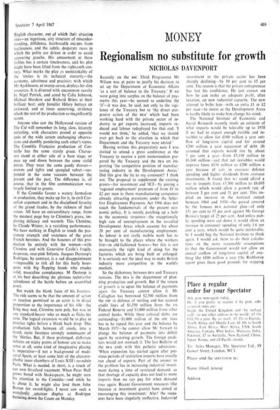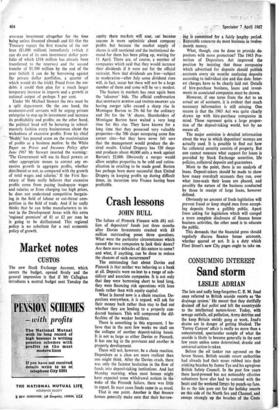Regionalism no substitute for growth
MONEY
NICHOLAS DAVENPORT
Recently on the Bec Third Programme Mr Wilson was at pains to justify his decision to set up the Department of Economic• Affairs `as a sort of balance to the Treasury.' If we were going into surplus on the balance of pay- ments this year—he seemed to underline the `if—it was due, he said, not only to the vigi- lance of the Treasury but to 'the direct pur-
posive action of the DEA' which had been
working hard with the private sector of in- dustry to get exports increased, imports re- duced and labour redeployed for that end. 'I would not think,' he added, 'that we should ever get back to the situation in which that Department and the Treasury were united.'
Having written this preparatory note I was invited to attend a press conference at the
Treasury to receive a joint memorandum pre- pared by the Treasury and the DEA on im- proving 'the competitive position of manufac- turing industry in the Development Areas.' Did this give the lie to my comment? I think not. The proposal to supplement the existing grants—for investment and SET--by paying a 'regional employment' premium of from £1 to £2 per man to those manufacturing companies already attracting premiums under the Selec- tive Employment Payments Act 1966 does not touch the fundamentals of the present eco- nomic policy. It is merely patching up a hote in the economic structure—the exceptionally high rate of unemployment in the so-called Development Areas which account for about 20 per cent of manufacturing employment. As labour is not really mobile work has to be brought to the places where the workers live—in old-fashioned houses—but this is not necessarily the right kind of siting for the factories which are being built or enlarged. It is certainly not the ideal way to make British industry more competitive in the world's markets.
So the dichotomy between DEA and Treasury remains. The DEA is the department of plan- ning production and growth. But if the return of growth is to upset the balance of payments again the Treasury cannot allow it. Mr Callaghan has borrowed $2,500 million from the IMF in defence of sterling and has secured credit lines of $1,350 million from the us Federal Reserve and $1,000 million from other central banks. While these colossal debts are outstanding—$1,000 million of the IMF loan has to be repaid this year and the balance by March 1971—he cannot allow Mr Stewart to plunge the balance of payments into deficit again by restoring growth. The foreign credi- tors would not stomach it. The last Bulletin of the DEA ends with this pathetic admission: `When expansion has started again after pre- vious periods of restriction imports have usually run ahead of exports. Part of the answer to the problem lies in increasing industrial invest- ment during a time of restricted demand, so that shortage of capacity does not lead to more imports than we can pay for when demand rises again. Recent Government measures (the increase in investment grants) have aimed at encouraging this investment.' Alas! the meas- ures have been singularly ineffective. Industrial
investment in the private sector has been sharply declining—by 10 per cent to 15 per cent. The reason is that the private entrepreneur has lost his confidence. He just cannot see how he can make an adequate profit, after taxation, on new industrial capacity. The new attempt to bribe him—with an extra £1 or £2 per man—`to invest in the Development Areas is hardly likely to make him change his mind.
The National Institute of Economic and Social Research recently made an estimate of what imports would be tolerable up to 1970 if we had to export enough (visible and in- visible) to allow for £100 million a year out- flow of long-term capital and for around £200 million a year repayment of debt. (It assumed that exports would rise by aboUt 5 per cent a year--from £5,110 million to £6,160 million—and that net invisibles would improve from £150 million to £200 million a year because of cuts in overseas defence spending and higher dividends from overseas investments. It found that wz could afford a rise in imports from £5,300 million to £6,095 million which would allow a growth rate of between 3 per cent and 34 per cent. This im- plied an increase in the national output between 1964 and 1970—the period covered by the famous DEA national plan—of only 133 per cent to 15 per cent against Mr George Brown's target of 25 per cent. And unless pub- lic spending were cut down it would allow an increase in consumer spending of only 1.6 per cent a year, which v.,nild be quite intolerable. So I would beg the National Institute to think again. I would ask them to do their calcula- tions on the more reasonable assumptions (i) that the Government would not allow an annual outflow of long-term capital of any- thing like £100 million a year (the Reddaway report gives them good grounds for stopping overseas investment altogether for the time being unless financed abroad) and (ii) that the Treasury repays the -first tranche of the IMF loan ($1,000 million) immediately (which it can do out of its own investment dollar port- folio of which £316 million has already been transferred to the reserves) and the second tranche of $1,500 million by the end of the year (which it can do by borrowing against the private dollar portfolios, a quarter of which would do the trick). Freed from the IMF debts it could then plan for a much larger temporary increase in imports and a growth in national output of perhaps 5 per cent.
Under Mr Michael Stewart the DEA must be a split department. On the one hand, the economist-civil servants will be urging private enterprise to step up its investment and increase its profitability and profits; on the other hand, the political head will be lecturing in school- masterly fashion every businessman about the wickedness of excessive profits. Even his chief 'Neddy' has poured scorn on the maximisation of profits as a business motive. In the White Paper on Prices and Incomes Policy after June 1967 Mr Stewart inserted the warning: The Government will use its fiscal powers or other appropriate means to correct any ex- cessive growth in aggregate profits, whether distributed or not, as compared with the growth of total wages and salaries.' If the First Sec- retary of State really believes that excessive profits come from paying inadequate wages and salaries or from charging too high prices, he does not understand competitive bargain- ing in the field of labour or cut-throat com- petition in the field of trade. And if he really thinks that he can bribe manufacturers to in- vest in the Development Areas with this extra 'regional premium' of £1 or £2 per man he is going to be disillusioned. This regional policy is no substitute for a real economic policy of growth.































 Previous page
Previous page